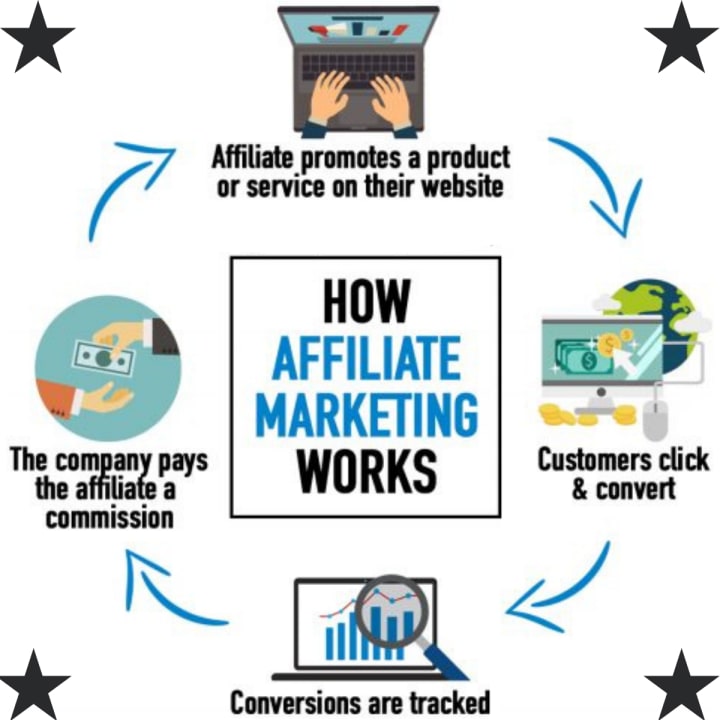What is Affiliate Marketing?
Understanding the Basics and How it Works!

Affiliate marketing is a performance-based online marketing strategy where individuals or businesses, known as affiliates, promote products or services offered by other companies in exchange for a commission on each sale they generate. It has become one of the most popular and lucrative ways for individuals to earn passive income and for businesses to expand their reach without investing heavily in traditional advertising.

1. The Core Concept of Affiliate Marketing:
At its core, affiliate marketing is based on revenue sharing. The process involves three primary parties: the merchant (or advertiser), the affiliate (or publisher), and the customer. The merchant is the company that creates and sells the product or service, the affiliate is the promoter, and the customer is the end user who makes the purchase.
2. How Affiliate Marketing Works:
To get started with affiliate marketing, an affiliate signs up for an affiliate program offered by a merchant. Once approved, the affiliate is given a unique affiliate link or ID that tracks their referrals. This link contains a special code that identifies the affiliate as the source of the referral.
3. Promotion and Referral Generation:
With their affiliate link in hand, the affiliate's primary task is to promote the merchant's products or services through various marketing channels. This can include creating content such as blog posts, reviews, videos, social media posts, email campaigns, and more.
4. Tracking and Attribution:
When a potential customer clicks on the affiliate's unique link and is redirected to the merchant's website, the affiliate marketing software tracks this action. If the customer makes a purchase, the affiliate software attributes the sale to the specific affiliate who referred the customer. This ensures that the affiliate receives the appropriate commission for their efforts.
5. Types of Affiliate Commissions:
Affiliate programs offer various types of commission structures. The most common ones are:
a. Pay Per Sale (PPS): Affiliates earn a percentage of the sale's value when a customer they referred completes a purchase.
b. Pay Per Click (PPC): Affiliates earn a commission for each click their affiliate link receives, regardless of whether a sale is made.
c. Pay Per Lead (PPL): Affiliates earn a commission for each qualified lead they refer, such as when a customer fills out a form or signs up for a free trial.
6. Affiliate Networks and Platforms:
Affiliate marketing networks and platforms act as intermediaries between merchants and affiliates. They provide a centralized place for affiliates to find and join multiple affiliate programs easily. Examples of popular affiliate networks include ShareASale, ClickBank, Amazon Associates, and CJ Affiliate (formerly Commission Junction).
7. Advantages of Affiliate Marketing:
For affiliates, the advantages include the ability to earn passive income, low start-up costs, and the opportunity to work from anywhere with an internet connection. On the other hand, merchants benefit from increased brand exposure, expanded customer reach, and cost-effective marketing campaigns where they only pay for successful sales or leads.
8. Challenges of Affiliate Marketing:
While affiliate marketing offers numerous benefits, it also presents some challenges. Competition among affiliates can be intense, requiring creative marketing strategies to stand out. Additionally, affiliates must comply with the merchant's guidelines, and improper marketing practices could lead to account termination or commission withholding.
9. Building a Successful Affiliate Marketing Strategy:
To succeed in affiliate marketing, affiliates must focus on their niche, select products that align with their audience's interests, and provide valuable content that educates and informs potential customers. They should also continuously analyze performance metrics to optimize their campaigns for better results.
10. The Future of Affiliate Marketing:
As technology and consumer behavior continue to evolve, affiliate marketing is also changing. Advancements in tracking and attribution, as well as the rise of influencer marketing, are shaping the industry's future. The use of artificial intelligence and machine learning is likely to play a significant role in refining affiliate marketing strategies and improving the overall user experience.
In conclusion, affiliate marketing is a dynamic and profitable online marketing model that benefits both affiliates and merchants. It allows individuals to earn passive income and businesses to expand their customer base, making it an essential component of the digital marketing landscape. As the industry continues to grow, staying informed and adapting to emerging trends will be key to long-term success in affiliate marketing.






Comments
There are no comments for this story
Be the first to respond and start the conversation.